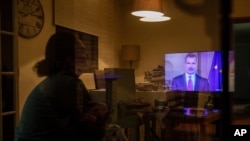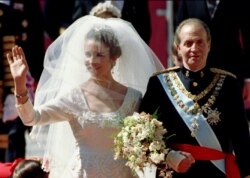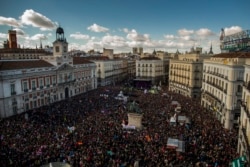Inside the Zarzuela Palace, the spacious residence of King Felipe VI of Spain, there is a corridor dedicated to cartoons about the royal family.
Most of the lighthearted jokes are by Spanish media but there is also one from France's Le Monde.
Conspicuous by its absence is the Spanish satirical magazine El Jueves. This is no accident.
When Felipe's father, Juan Carlos I, abdicated in 2014 after nearly 40 years on the throne, the magazine's artists marked the occasion with a special front page cartoon.
It showed the former king passing his son a crown covered in excrement -- a pointed reference to the scandals which had led to Juan Carlos' decision to quit the throne.
It did not go down well at the Zarzuela. El Jueves was ordered to withdraw the magazine from sale and gave in to pressure, as insulting the royal family is a criminal offense in Spain.
“It seemed that we could make fun of Juan Carlos' love life but if we said anything about his financial affairs or anything about how he ruled, that would not be tolerated,” Isaac Rosa, a former writer for El Jueves told VOA.
“Many staff, myself included, left in protest. We all knew about these allegations, but no one reported it in Spain. That has changed now.”
A financial scandal involving the 82-year-old ex-king has put into sharp relief Spaniards' relationship with the monarchy. Spain's supreme court prosecutor began an investigation into the role of its former king in a $7.5 billion deal to build a high-speed rail link in Saudi Arabia.
Prosecutors are examining if there is any evidence of money laundering and fraud after Juan Carlos left the throne, as the Spanish constitution says serving monarchs cannot be prosecuted.
The story revolves around allegations made by Juan Carlos' former lover, Corinna zu Sayn-Wittgenstein, a German businesswoman who lives in London. She said they had maintained a relationship between 2004 and 2009. The king remains married to Queen Sofia.
Sayn-Wittgenstein claimed in 2015 in a taped conversation with a former police officer which was later leaked to the Spanish media that Juan Carlos asked for a kickback from the Spanish consortium involved in the deal. Almost $90 million was allegedly paid to the king by the consortium through Shahpari Zanganeh, the widow of Saudi arms dealer Adnan Khashoggi.
The consortium has denied paying any kickback.
Sayn-Wittgenstein said Juan Carlos later gave her $65 million.
Separately, in 2008, Juan Carlos is alleged to have received a $100 million gift from Saudi Arabia which was deposited in a Swiss bank account.
The magistrate is investigating two financial advisers to Juan Carlos who handled accounts in Switzerland and Panama City.
Spain's relationship with monarchy has in recent years been an uneasy one.
The dictator Gen. Francisco Franco nominated Juan Carlos as his successor before he died in 1975.
Before Franco came to power after winning the civil war in 1936-39, Spain voted in 1931 to get rid of Juan Carlos' grandfather Alfonso XIII and usher in a republic.
Juan Carlos was lauded for helping to uphold a fragile new democracy.
In 1981, when armed police stormed the Spanish parliament in an attempted coup d'etat, Juan Carlos made a televised address to the nation backing democracy and faced down the plotters. The coup failed.
Despite his love of bullfighting, fast cars and women to whom he was not married, the king was a popular figure.
Yet doubts remained. Spaniards were often described as “more juan carlistas than monarquistas” meaning they supported the person of Juan Carlos more than the monarchy itself.
Attitudes changed in 2012 when Juan Carlos had to be flown back from Botswana to Spain after he injured himself during a secret elephant hunting safari with Sayn-Wittgenstein.
Spaniards were appalled as millions were struggling to survive a deep recession.
When Felipe came to the throne, he promised a “renewed monarchy for new times” and vowing to “listen, understand, warn and advise.”
In March, Felipe was forced to renounce his personal inheritance from his father after it was alleged that he was set to receive millions of euros from a secret offshore fund linked to Saudi Arabia.






